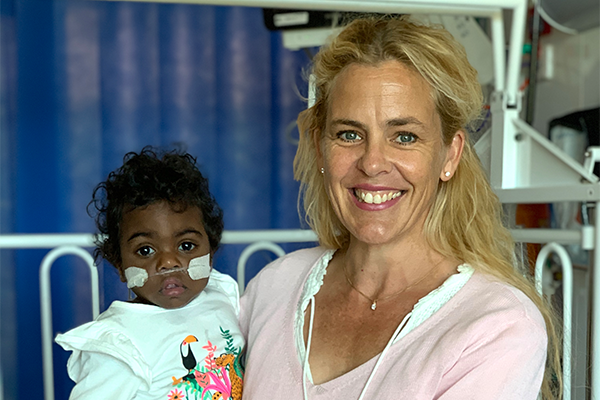Spotlight on research: Pam Laird

A desire to help ‘bridge the gap’ in health outcomes for Aboriginal kids has driven Pam Laird, PCH respiratory physiotherapist and self-described ‘reluctant researcher’ to complete a PhD.
Ten years ago, Pam recalls meeting a young patient during her work as part of the multidisciplinary PMH Respiratory Outreach clinic in the Kimberley. She became aware that families were not recognising the early symptoms of bronchiectasis, or ‘chronic wet cough’, in their children and consequently were visiting the clinics too late, when lung damage was already permanent. The experience prompted Pam to question how care could be better delivered to these patients.
Pam’s experience highlights the difference clinician researchers can make in delivering better health outcomes for their patients.
“When we became aware of the large number of Aboriginal children with lung disease and the delay in diagnosis, we realised a way to improve health outcomes for kids was through knowledge translation research,” she said.
A CAHS Allied Health research grant provided a foundation which ignited a passion for research she describes as ‘life changing’ culminating in her PhD.
Ever since Pam has worked around the clock, made countless trips to the north west of WA and successfully published four papers to fulfil her mission of improving the lung health of Aboriginal children. She co-developed a multi-media awareness raising campaign, adapted a suite of culturally secure flipcharts to improve family knowledge about lung health and co-conducted training for primary care clinicians in early recognition and management of chronic wet cough.
Her work represents a close collaboration and partnership between PCH, Telethon Kids Institute, the Broome and Kimberley Aboriginal Medical Services and Aboriginal communities in the Kimberley.
“By working together, we have demonstrated that culturally secure care improves family knowledge and health outcomes for Aboriginal children.”
Building the capacity of local clinicians to manage the condition combined with providing culturally secure health information for families helped achieve an almost threefold increase in the number of families seeking help for their child’s chronic wet cough.
“At every step of the way, we aimed to empower families and local clinicians with knowledge. Aboriginal children who were identified with chronic wet cough were able to get immediate treatment through the local clinic, given the clinicians now had the knowledge to treat the children.”
Working closely with cultural advisors, throughout her research to ensure it was community led has also been integral to her strategy and has fundamentally changed her world view and clinical practice.
Her next project, the Aboriginal Children’s Excellence (ACE) lung health study, funded through the Perth Children’s Hospital Foundation and the WA Health Translation Network, aims to improve follow up for Aboriginal children who have been hospitalised at PCH with chest infections through provision of culturally secure care and health information to families.
Pam believes the work presents opportunities to adapt to other health conditions and translate culturally secure care to a broader context.
“It’s been a real privilege to work with the Aboriginal communities and have the opportunity to learn from families and also to make a positive difference in their lives.”

